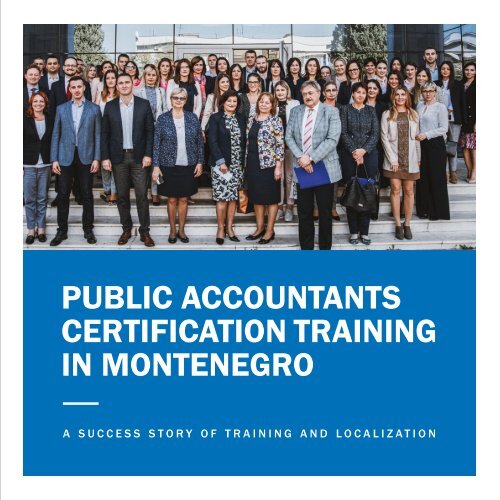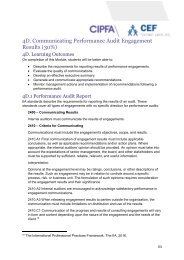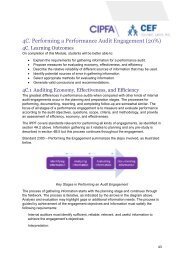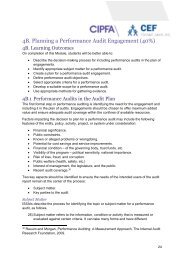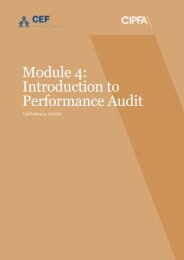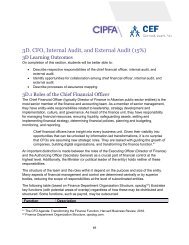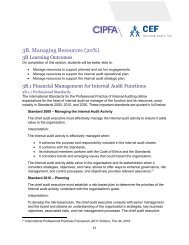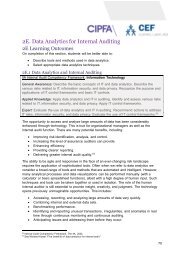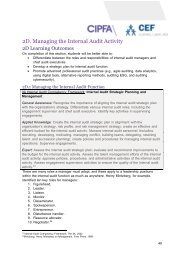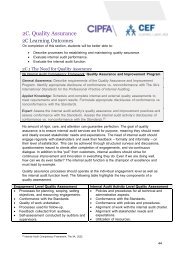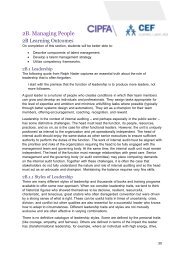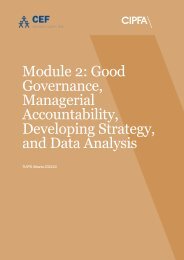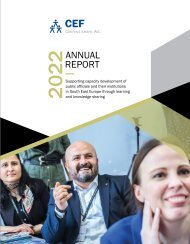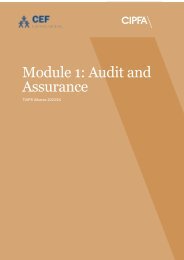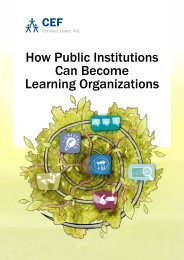Public Accountants Certification Training (PACT) Brochure 2020
Create successful ePaper yourself
Turn your PDF publications into a flip-book with our unique Google optimized e-Paper software.
PUBLIC ACCOUNTANTS<br />
CERTIFICATION TRAINING<br />
IN MONTENEGRO<br />
A SUCCESS STORY OF TRAINING AND LOCALIZATION
STRONG COOPERATION<br />
WITH LOCAL INSTITUTIONS<br />
public accountants. Numerous applications for the training<br />
course in 2016 showed that the interest of accountants<br />
exceeded the training capacity. After the completion of<br />
the first year of training, it was continued for the second<br />
generation of accountants in 2017 and for the third<br />
generation in 2018.<br />
Quality accounting information is crucial for<br />
public finance management (PFM). Bearing<br />
in mind that accrual accounting increases the<br />
comprehensiveness and quality of accounting information,<br />
and with the intention to converge towards the principles<br />
of accrual accounting, in 2015 the Government of Montenegro<br />
adopted the Strategy for Transition to Accrual-Based<br />
<strong>Public</strong> Accounting.<br />
With the adoption of the Strategy, it became apparent<br />
that training public accountants is one of the pillars of the<br />
accounting reform. In the same year, the Ministry of Finance<br />
started the <strong>Public</strong> <strong>Accountants</strong> <strong>Certification</strong> <strong>Training</strong> (<strong>PACT</strong>),<br />
recognizing the Centre for Excellence in Finance (CEF) as<br />
a strong partner in developing capacities in accounting.<br />
Applying the methodology of the Chartered Institute of<br />
<strong>Public</strong> Finance and Accountancy (CIPFA) from the UK, it<br />
was clear from the outset that all the preconditions for the<br />
success of this project had been created.<br />
In an effort to preserve the sustainability of the project, the<br />
Ministry of Finance, together with the CEF and the Human<br />
Resources Management Authority (HRMA), immediately<br />
started to work on localizing the training program, so that<br />
after providing international support, the project would<br />
become a national training and certification program for<br />
To promote the accounting reform in the public sector,<br />
in 2018 the Ministry of Finance and the CEF organized<br />
regional conference Transition to Accrual Accounting.<br />
Prominent experts from the country and abroad attended<br />
the conference. In the same year, the Ministry of Finance<br />
started to develop the Law on <strong>Public</strong> Sector Accounting.<br />
The goal was to integrate the reform efforts of the<br />
Government of Montenegro in this area and create the<br />
basis for the implementation of accrual-based accounting<br />
in the public sector.<br />
In parallel to the training of the third generation of<br />
accountants, one of the most relevant laws in the area<br />
of public finances has been under preparation, which will<br />
bring accountants numerous novelties and challenges in<br />
their work. In order to be well prepared, two workshops<br />
were organized within the <strong>PACT</strong> project that addressed<br />
international accounting standards that the Ministry of<br />
Finance thought would be the most challenging to apply.<br />
In November 2019, the Law on <strong>Public</strong> Sector Accounting<br />
was adopted and the training of the third generation of<br />
certified accountants was successfully completed. The<br />
international certification training may have come to an<br />
end but at the same time this is a new beginning for the<br />
start of local training and implementation of the public<br />
sector accounting reform.<br />
MARIJA ULJAREVIĆ<br />
Head of the Division for Budgetary Accounting and Reporting<br />
Ministry of Finance, Montenegro<br />
2 3
The HRMA, in cooperation with<br />
colleagues from the Ministry of<br />
Finance and the CEF, has been<br />
involved in the coordination of<br />
the <strong>PACT</strong> program. It has assisted in the<br />
implementation of activities for accountants<br />
who have received a certificate, and has<br />
greatly contributed so that the whole team<br />
has functioned in an un-interrupted cycle.<br />
We value the know-how obtained through the<br />
involvement of local coordinators, exchange<br />
of experience of all program contributors,<br />
and successful implementation and viability<br />
of the project. It will be used by the HRMA in<br />
the implementation of other programs in the<br />
future.<br />
The role of the local coordinator<br />
has given me a rich five-year experience,<br />
new knowledge and skills.<br />
It also brought successful collaboration<br />
with colleagues from the CEF and the<br />
Minis try of Finance, building a good organizational<br />
climate through developing team spirit.<br />
The rights and responsibilities of the local coordinator<br />
and the challenges experienced during<br />
the training have contributed to strengthening<br />
and developing professional capacities, which<br />
in the coming period will affect performance,<br />
personal development, further career development<br />
and advancement in public administration.<br />
The gained practice, knowledge and<br />
experience will certainly be used also in the implementation<br />
of new programs by the HRMA.<br />
JADRANKA ĐURKOVIĆ<br />
Deputy Director<br />
Human Resources Management Authority<br />
(HRMA), Montenegro<br />
TIJANA VAKIREVIĆ<br />
Local Coordinator<br />
Human Resources Management Authority<br />
(HRMA), Montenegro<br />
4 5
THE JOURNEY<br />
OF LOCALIZATION<br />
Sharing its experience in becoming a regional knowledge<br />
hub, the CEF supports constituent institutions in developing<br />
their organizational knowledge sharing capacity and strategic<br />
human resources development.<br />
Sustainability of the certification training is crucial for the<br />
successful implementation of PFM reforms, so the Ministry<br />
of Finance of Montenegro committed to develop systems and<br />
processes and ensure resources and infrastructure to fully run<br />
the program locally, on their own.<br />
One of these resources was the Localization Working Group,<br />
composed of experts in accounting, representatives of the<br />
Ministry, the takeover institution - HRMA, and the CEF. The<br />
main goal of the localization process has been to enable the<br />
environment for full localization: adjusting local legislation,<br />
strengthening the relationship between the Ministry and the<br />
takeover institution, and preparing the takeover institution for<br />
independent work.<br />
After analyzing the training needs, deciding among the options<br />
for localization, making legislative changes to support local<br />
recognition of the <strong>PACT</strong> certificate, drafting a manual for<br />
implementation, and establishing a group of trained tutors,<br />
the grounds for the delivery of localized training are ready.<br />
ILUSTRATION: FEDERICA TABONE<br />
ANA FRANGEŽ KERŠEVAN<br />
Localization Working<br />
Group Member<br />
Senior Partnership Officer<br />
Center of Excellence<br />
in Finance (CEF)<br />
6 7
Strategy for <strong>Public</strong> Sector<br />
Transition to Accrual<br />
Accounting<br />
Action plan<br />
for implementation<br />
of the Strategy<br />
Adoption of the Law<br />
on Accounting<br />
in <strong>Public</strong> Sector<br />
Law on Accounting<br />
in <strong>Public</strong> Sector<br />
comes into effect<br />
Mar<br />
2015<br />
Mar<br />
2018<br />
Nov<br />
2019<br />
Jan<br />
2022<br />
Preparation of<br />
<strong>PACT</strong> training<br />
Apr<br />
2016<br />
Jan<br />
2017<br />
Sep<br />
2018<br />
Launch of<br />
training<br />
(1 st generation)<br />
Launch of<br />
training<br />
(2 nd generation)<br />
Launch of<br />
training<br />
(3 rd generation)<br />
Jan<br />
2018<br />
Oct<br />
2019<br />
Feb<br />
<strong>2020</strong><br />
Dec<br />
2016<br />
Regional<br />
conference<br />
Transition to<br />
Accrual<br />
Accounting<br />
Sep<br />
2018<br />
IPSAS<br />
training<br />
Oct<br />
2019<br />
IPSAS<br />
training<br />
Graduation of<br />
1 st generation<br />
Graduation of<br />
2 nd generation<br />
Graduation of<br />
3 rd generation<br />
Mar<br />
2018<br />
Jun<br />
<strong>2020</strong><br />
Drafting Law on Accounting in <strong>Public</strong> Sector and its by-laws<br />
Localization process: Throughout the implementation of three generations of certification, the localization process was running in parallel.<br />
It included: analysis of professional capacity and training needs; translation of the study materials of international modules into the local<br />
language; training of local tutors; facilitation of training on National Legislation and Taxation; transfer of knowledge and skills; coaching<br />
of local institutions’ representatives; setting the legal framework; and drafting a manual for the independent running of localized training.<br />
8 9
VALUABLE SUPPORT<br />
OF LOCAL EXPERTS<br />
These five years of training public<br />
accountants in Montenegro within<br />
the <strong>PACT</strong> project were an exciting<br />
challenge for me as a lecturer and<br />
professor, mostly in didactic sense. Through<br />
interactive teaching and use of various modern<br />
methods, the training students were assisted<br />
to have a correct understanding of the<br />
subject matter and the implementation of<br />
IPSAS in accounting.<br />
Bearing in mind the differences in the competences<br />
and skills of each individual, the teaching<br />
methods were selected carefully in order to<br />
offer them adequate training, with the objective<br />
that every student is trained for the challenges<br />
that modern public accounting is facing. This<br />
approach to training helped ensure their successful<br />
completion of the training course.<br />
VLADAN MARTIĆ<br />
Senior Tutor for Management Accounting<br />
Docent<br />
Mediterranean University, Montenegro<br />
As a junior tutor, I had the pleasure of being part<br />
of a team of colleagues who worked with the<br />
<strong>PACT</strong> program. Although I have been professor<br />
of accounting at the Faculty of Economics in<br />
Montenegro for more than twenty years, I am pleased to<br />
admit that the experience I gained during my preparation<br />
to become a lecturer in the <strong>PACT</strong> program and during my<br />
performance, was of invaluable importance for upgrading my<br />
existing knowledge and gaining new, innovative, theoretical,<br />
practical and pedagogical knowledge and competences.<br />
I especially liked a different approach to problem solving<br />
that required innovative and comprehensive incentives and<br />
transfer of knowledge, which are focused on the concrete<br />
and more practical dimension of the problem. I will use this<br />
experience and new pedagogical approach at my lectures<br />
to encourage students to think differently when solving<br />
problems.<br />
ANA LALEVIĆ FILIPOVIĆ<br />
Junior Tutor for Management Accounting<br />
and Financial Accounting<br />
Full-Time Professor<br />
University of Montenegro, Faculty of Economics, Montenegro<br />
10 11
The <strong>PACT</strong> learning activities in Montenegro<br />
from 2015 until today have made a large<br />
contribution to the country, not only by<br />
segments, but holistically. As a senior tutor<br />
in the Financial Accounting module, I have had the<br />
pleasure to be part of the <strong>PACT</strong> program.<br />
First of all, it is a good opportunity for the public<br />
sector in Montenegro to have lectures in accounting<br />
on accrual basis, taking note of the International<br />
Accounting Standards. I highlight this because our<br />
public accounting system is cash basis accounting, and<br />
international certification is a very important factor for<br />
improving this segment of the public sector.<br />
The books and other teaching materials, such as examination<br />
guidelines and grading methodology, are provided<br />
by CIPFA and contribute additional value to this project.<br />
We have very strong and clear procedures in place for<br />
the teaching methodology, exams and grading. This is a<br />
new and important professional experience, as all of us<br />
can improve our daily work based on this methodology.<br />
This educational process helps public sector accountants<br />
to improve their perception of the importance of<br />
accounting information at all management levels, especially<br />
for people that make economic, political and<br />
management decisions.<br />
To summarize this success story, all the above<br />
aspects, which are very positive and important for<br />
the whole training process, were at the same time<br />
a huge challenge for me as a tutor. It took a lot of<br />
hard work to create a new educational environment<br />
for public sector accountants, implement all the<br />
training activities successfully, and help candidates<br />
understand the importance of continuing education<br />
in the accounting area.<br />
Last but not least, I had great pleasure working with<br />
colleagues from the Ministry of Finance, the CEF and<br />
CIPFA, and the HRMA. I hope that projects like these<br />
will remain our practice also in the future.<br />
MILICA DAKOVIĆ TADIĆ<br />
Senior Tutor for Financial Accounting<br />
Assistant Professor<br />
Faculty for International Economy, Finance and<br />
Business, University Donja Gorica, Montenegro<br />
My participation in the <strong>PACT</strong> program was a positive and useful<br />
experience: first as a student in the second generation of the<br />
training and later as a junior tutor in the third one. I enjoyed<br />
working in a friendly atmosphere, being engaged in a quality<br />
program with high professional standards and working closely with lecturers<br />
who showed a great deal of competency, dedication and attentiveness.<br />
The program encompassed three important aspects of accounting and financial<br />
affairs: the legislation valid in Montenegro; the international aspect<br />
of accrual financial accounting with reporting; and management accounting.<br />
We learnt how the principles of management accounting can be applied<br />
in everyday work when reporting on different levels of managerial structure,<br />
and making different analyses important for decision-making in our institutions.<br />
In addition, we had training in IPSAS, which will enable easier transformation<br />
of the existing cash-based accounting systems to accrual-based<br />
accounting. I believe that we, <strong>PACT</strong> students, adopted the principles of dual<br />
accounting to a sufficient extent so that we can be the holders of these<br />
changes in our institutions. The program is challenging and the exams are<br />
designed to test not only knowledge but also the speed of problem solving.<br />
A particularly interesting and pleasant experience for me personally was my<br />
role of a lecturer – junior tutor. I benefited a lot from the <strong>Training</strong> of Trainers,<br />
which helped me prepare for my new role. It was organized as a creative and<br />
fun workshop, useful not only for the needs of teaching and educating, but<br />
contributing also to other spheres of life and work.<br />
I believe that the <strong>PACT</strong> program is the right step toward building and<br />
upgrading the knowledge and skills that are needed for the transition to<br />
accrual-based accounting system in line with IPSAS. It has significantly<br />
improved my professional and personal capabilities.<br />
IVANA ĆETKOVIĆ<br />
<strong>PACT</strong> Student and Junior Tutor for Management Accounting<br />
Accountant<br />
Private Accounting Agency, Montenegro<br />
Joining the <strong>PACT</strong> program, first as a<br />
student of the second generation<br />
and later as a junior tutor of the third<br />
one, offered me a chance to take<br />
part in many interesting events and activities. It<br />
gave me an opportunity to observe accountancy<br />
from a different angle and to learn from welldesigned<br />
study materials as well as excellent and<br />
comprehensive presentations made by local and<br />
international tutors.<br />
My biggest challenge as a tutor was how to pass<br />
on the knowledge in the most appropriate and<br />
useful way and how to get students interested in<br />
the lectures. Students, experienced accountants,<br />
may often get into the trap that the topics are<br />
familiar and expect that exams would be easy to<br />
pass with no or just a little effort. It is the tutor’s<br />
duty to convince them of the opposite and make<br />
them understand that without hard work, learning<br />
and attending classes, it is not possible to obtain<br />
an internationally recognized certificate.<br />
It was not an easy path, being a student and<br />
becoming a junior tutor, but it turned out to be<br />
a successful journey with lots of benefits. It is<br />
difficult to choose one, but I would expose better<br />
understanding of IPSAS.<br />
SRĐANA MILIĆEVIĆ<br />
<strong>PACT</strong> Student and Junior Tutor<br />
for Management Accounting<br />
Head of Treasury and Accounting Sector<br />
Finance Secretariat, Budva Municipality,<br />
Montenegro<br />
12 13
Being students in the first generation of the training, becoming junior tutors in<br />
the second one and upgrading to the senior level in the third generation, we<br />
understood that the <strong>PACT</strong> program is extremely important for the entire public<br />
sector of Montenegro. The main advantage of this program is the knowledge<br />
it offers, improving accountants’ everyday work process in general.<br />
Not all public sector accountants had the opportunity to take part in the <strong>PACT</strong> training –<br />
we were lucky. We strongly believe that it is necessary to continue with the <strong>PACT</strong> program<br />
and involve all public sector accountants in the training. Moreover, we believe that Montenegro<br />
needs to introduce also the diploma level of <strong>PACT</strong> program to upgrade the knowledge<br />
needed for decision-making. Only skilled and qualified accountants can provide a<br />
solid basis for managing public finances in the best possible way.<br />
IVAN ZVICER<br />
<strong>PACT</strong> Student and Tutor<br />
for Financial Accounting<br />
Accountant<br />
Ministry of Education,<br />
Montenegro<br />
BOJANA JOVETIĆ<br />
<strong>PACT</strong> Student and Tutor<br />
for Financial Accounting<br />
Head of Department for General<br />
Affairs and Finance<br />
Ministry of <strong>Public</strong> Administration,<br />
Montenegro<br />
14 15
PARTNERSHIPS<br />
IN <strong>PACT</strong> PROJECTS<br />
The Ministry of Finance of Slovakia has<br />
been offering technical assistance to<br />
the Ministry of Finance of Montenegro<br />
through the <strong>Public</strong> Finance for Development<br />
Programme and in cooperation with the UNDP<br />
since 2010. It has provided policy, methodological,<br />
legal and capacity support for gradual transition to<br />
accrual accounting reporting under IPSAS.<br />
As a result of Slovakia’s contribution and Montenegro’s<br />
perseverance, the conditions for the PFM reform<br />
have improved and progress has been made,<br />
notably the adoption of the Strategy for the Transition<br />
to Accrual Accounting in 2015 and the <strong>Public</strong><br />
Sector Accounting Law in 2019. The new legislative<br />
framework will allow for generating and providing reliable<br />
and accurate data for decision-making at the<br />
national level, and increase transparency of public<br />
finance and accountability of the government both<br />
to internal and external users.<br />
To secure faster progress in public sector accounting<br />
and reporting, the Slovak Ministry of Finance has<br />
decided to broaden its efforts and fund a complementary<br />
capacity development initiative – the <strong>PACT</strong><br />
program. This training program has been running<br />
simultaneously with the technical assistance to the<br />
Ministry of Finance of Montenegro as the leader of<br />
the transition process. The target beneficiaries are<br />
public accountants who are expected to transform<br />
new accounting and reporting policies into their daily<br />
practice as the changes become effective.<br />
To prevent inconsistencies and secure quality performance<br />
in this field, the project’s aspirations<br />
were set beyond the training itself and introduced<br />
a sustainable education framework of public sector<br />
accountants in Montenegro, to be managed by<br />
respective Montenegrin authorities. Taking into account<br />
that before 2015 there was no training in this<br />
area available, ongoing work on localization of the<br />
program seems to bring about a great impact on the<br />
effective implementation of accounting policies.<br />
MARIANNA MACÁŠKOVÁ<br />
International Relations Specialist<br />
Ministry of Finance, Slovakia<br />
16 17
Slovenia has supported<br />
the delivery of the<br />
<strong>PACT</strong> training program<br />
in Montenegro as part<br />
of its efforts to encourage the development<br />
of effective, responsible<br />
and transparent institutions at all<br />
levels in partner countries of our<br />
development cooperation.<br />
Montenegro is a priority country of<br />
Slovenia’s development cooperation,<br />
which upgrades the excellent<br />
political and economic relations as<br />
well as other forms of cooperation<br />
between the two countries. We believe<br />
that our multiannual support<br />
to the program has helped to provide<br />
sufficient capacity to facilitate<br />
further successful development of<br />
public accounting in Montenegro.<br />
ANITA PIPAN<br />
Ambassador, Acting Director-<br />
General for Multilateral Affairs,<br />
Development Cooperation and<br />
International Law<br />
Ministry of Foreign Affairs,<br />
Slovenia<br />
Effective and responsible financial<br />
management within<br />
the public sector contributes<br />
to good governance by<br />
emphasizing accountability, transparency,<br />
and support for the rule of law.<br />
Perhaps even more importantly, public<br />
sector accounting plays a large role in<br />
maintaining the Montenegrin people’s<br />
confidence in the institutions that impact<br />
their everyday lives. Strengthening<br />
financial management institutions and<br />
improving public accounting standards<br />
also help fulfill several requirements<br />
in the EU accession process and facilitate<br />
Montenegro’s integration into<br />
Euro-Atlantic institutions and financial<br />
markets.<br />
We are therefore proud that the United<br />
States government, through the Emerging<br />
Donors Challenge Fund, was able to<br />
support the delivery of this training program,<br />
together with other partner countries.<br />
The United States will continue to<br />
support valuable capacity development<br />
programs, such as this training, as well<br />
as other efforts to help Montenegro’s integration<br />
into Euro-Atlantic institutions.<br />
DRAGANA TATIĆ<br />
Political Officer<br />
Embassy of the United States of<br />
America, Montenegro<br />
The CIPFA is honored<br />
to support the <strong>PACT</strong><br />
program, delivered<br />
in Montenegro for<br />
three generations of public sector<br />
accountants. We commend<br />
the <strong>PACT</strong> training program which<br />
is a key part of the Montenegrin<br />
government’s efforts to build and<br />
strengthen professional qualifications<br />
for accountants. Jointly with<br />
the CEF we provide a great opportunity<br />
for training and skills development<br />
for public sector finance<br />
staff, meeting the needs of government<br />
to ensure they have the skills<br />
to respond to their PFM challenges<br />
and reforms. We are delighted to<br />
collaborate with the CEF to deliver<br />
excellence in IPSAS qualifications,<br />
as well as awarding our certificates<br />
to successful candidates.<br />
KHALID HAMID<br />
Divisional Director, International<br />
Chartered Institute of <strong>Public</strong><br />
Finance & Accountancy (CIPFA)<br />
Countries must have capacity to take<br />
active roles in setting up and implementing<br />
their demanding PFM reform<br />
agendas.<br />
The CEF staff and I feel honored to be entrusted<br />
with a task to develop, design, and facilitate the<br />
implementation of the certification program for<br />
public sector accountants. The program directly<br />
responds to the capacity development needs of<br />
individuals, teams and institutions in a country.<br />
Thus far 428 students have graduated from<br />
the <strong>PACT</strong> program at a certificate level and 292<br />
students at a diploma level in eight countries.<br />
Equally important, the program pays a lot of<br />
attention to three additional areas. First, it makes<br />
sure that national tutors are trained in the subject<br />
matter and methodology. Thus far a sufficient pool<br />
of local tutors in Montenegro have been trained<br />
and many of them have become the driving forces<br />
for the public sector accounting profession in<br />
Montenegro. Second, the program makes sure that<br />
the certification training is anchored in national<br />
legislation. Third, it helps identify national training<br />
institutions and develop their capacity to take over<br />
and independently run the program.<br />
Our motivation and work have been based on strong<br />
ownership by the Ministry of Finance of Montenegro<br />
as well as partnerships with donors and partners.<br />
JANA REPANŠEK<br />
Director<br />
Center of Excellence in Finance (CEF)<br />
Our training and localization journey in Montenegro has<br />
come to a point where we will take a break and celebrate<br />
what we have achieved so far. And we have achieved<br />
great things together! Congratulations to all Montenegrin<br />
accountants who have successfully finished the training.<br />
When coming to Montenegro in 2015 as a manager of <strong>PACT</strong> projects, I<br />
faced a new country and new mentality, and many times I found myself<br />
in a new role. There were challenges that no one could predict, and no<br />
one prepares you how to overcome them. It is a creative and innovative<br />
process that requires team work and persistence.<br />
Especially at the beginning but also throughout the project, a lot of<br />
effort was invested in building the network of partners, gaining their<br />
trust and convincing them to take new approaches and open up for<br />
new opportunities. And it paid off. Gradually we became a team of<br />
collaborators, motivated to seek how this training program could<br />
support the simultaneously evolving accounting reform in the best<br />
possible way. Jointly we attracted lots of renowned international<br />
experts and consultants who brought a wider perspective of the<br />
accounting reform and gave us valuable recommendations for<br />
successful transition toward accrual accounting.<br />
Working with all these people, who were highly motivated and devoted<br />
to help improve the accounting system, has been a truly rewarding<br />
experience. I am proud that I had the opportunity to take part in this<br />
journey and to witness the achievements in the process of improving<br />
the accounting and financial reporting system in Montenegro. I wish<br />
you a successful continuation of the training and implementation of<br />
the accounting reform.<br />
JASMINA POPOVIĆ<br />
Project Manager of <strong>PACT</strong> in Montenegro<br />
Program Officer<br />
Center of Excellence in Finance (CEF)<br />
18 19
<strong>PACT</strong> TUTORS<br />
NATIONAL<br />
LEGISLATION<br />
AND<br />
TAXATION<br />
FINANCIAL<br />
ACCOUNTING<br />
MANAGEMENT<br />
ACCOUNTING<br />
MARIJA POPOVIĆ<br />
STOJA ROĆENOVIĆ<br />
MILOŠ BALETIĆ<br />
JELENA MIRKOVIĆ<br />
CMILJANA ĆETKOVIĆ<br />
TATJANA BOŠKOVIĆ<br />
MILICA DAKOVIĆ TADIĆ<br />
MLADEN VLAHOVIĆ<br />
ENESA BEKTEŠI<br />
IVAN ZVICER<br />
BOJANA JOVETIĆ<br />
ANA LALEVIĆ FILIPOVIĆ<br />
RAJKA TOMOVIĆ<br />
IGOR PAVIĆEVIĆ<br />
VLADAN MARTIĆ<br />
MLADEN VLAHOVIĆ<br />
ANA LALEVIĆ FILIPOVIĆ<br />
SRĐANA MILIĆEVIĆ<br />
IVANA ĆETKOVIĆ<br />
IRENA JANKOVIĆ<br />
20 21
GENERATIONS & DONORS<br />
<strong>PACT</strong><br />
CERTIFIED<br />
ACCOUNTANTS<br />
PROJECT<br />
DONORS<br />
FIRST<br />
GENERATION<br />
2015/2016<br />
23<br />
Ministry of Finance, Slovakia<br />
through UNDP Partnership for Results in<br />
the International Development Cooperation,<br />
<strong>Public</strong> Finance for Development Program<br />
SECOND<br />
GENERATION<br />
2017/2018<br />
24<br />
Embassy of the United States of America,<br />
Montenegro<br />
through the US Emerging Donor Challenge Fund<br />
Ministry of Foreign Affairs, Slovenia<br />
through Slovenian Development Cooperation<br />
THIRD<br />
GENERATION<br />
2018/<strong>2020</strong><br />
28<br />
Ministry of Finance, Slovakia<br />
Ministry of Foreign Affairs, Slovenia<br />
through Slovenian Development Cooperation<br />
75<br />
IN TOTAL<br />
The CEF and The Ministry of Finance<br />
of Montenegro supported all <strong>PACT</strong> projects<br />
through in-kind contributions.<br />
Statements expressed in this publication do not necessarily reflect the views of the CEF, the institutions and governments of countries represented.<br />
22 23
CEF at a Glance<br />
OUR MISSION<br />
We support capacity development for finance officials in South East<br />
Europe through learning.<br />
OUR WORK<br />
We work with our constituency by directly contributing to the design and<br />
implementation of their public financial management, tax policy and<br />
administration, and central banking reform efforts. We do this through<br />
innovative, participatory, and practical learning solutions. The CEF<br />
serves as a knowledge hub for the region: we combine topical expertise<br />
and in-depth knowledge of countries in the region with a good grasp of<br />
leadership skills required to manage reforms. We know how to nurture<br />
and deepen learning among individuals and institutions.<br />
OUR HISTORY<br />
We were established in 2001 under the Stability Pact for South East<br />
Europe by the Slovenian Government, at the initiative of the Slovenian<br />
Ministry of Finance and in close cooperation with other ministries of<br />
finance of former Yugoslav countries and Albania. In 2015, the CEF<br />
became an international organization after 14 very successful years as<br />
a regional institution.<br />
OUR CONSTITUENCY<br />
We primarily serve ministries of finance, tax administrations, and central<br />
banks in Albania, Bosnia and Herzegovina, Bulgaria, Croatia, Kosovo,<br />
Moldova, Montenegro, North Macedonia, Romania, Serbia, Slovenia,<br />
and Turkey. We also address capacity development needs of other key<br />
stakeholders and are present in some other countries.<br />
Cankarjeva 18<br />
1000 Ljubljana<br />
Slovenia<br />
+386 1 369 6190<br />
info@cef-see.org<br />
www.cef-see.org<br />
FOLLOW<br />
US ON<br />
Subscribe to our<br />
newsletter at<br />
www.cef-see.org<br />
Published by: Center of Excellence in Finance (CEF) • Photo: CEF Archive. The photos have been taken at actual CEF events. • Design: Sonja Eržen • Print: Tiskarna Januš, d. o. o.


